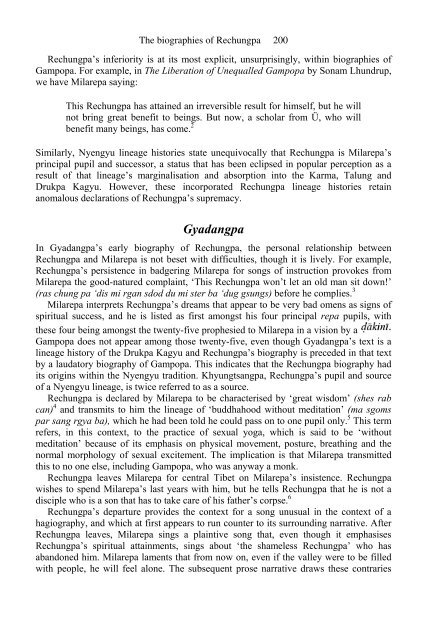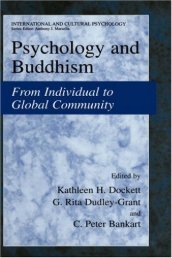The Biographies of Rechungpa: The Evolution of a Tibetan ...
The Biographies of Rechungpa: The Evolution of a Tibetan ...
The Biographies of Rechungpa: The Evolution of a Tibetan ...
You also want an ePaper? Increase the reach of your titles
YUMPU automatically turns print PDFs into web optimized ePapers that Google loves.
<strong>The</strong> biographies <strong>of</strong> <strong>Rechungpa</strong> 200<br />
<strong>Rechungpa</strong>’s inferiority is at its most explicit, unsurprisingly, within biographies <strong>of</strong><br />
Gampopa. For example, in <strong>The</strong> Liberation <strong>of</strong> Unequalled Gampopa by Sonam Lhundrup,<br />
we have Milarepa saying:<br />
This <strong>Rechungpa</strong> has attained an irreversible result for himself, but he will<br />
not bring great benefit to beings. But now, a scholar from Ü, who will<br />
benefit many beings, has come. 2<br />
Similarly, Nyengyu lineage histories state unequivocally that <strong>Rechungpa</strong> is Milarepa’s<br />
principal pupil and successor, a status that has been eclipsed in popular perception as a<br />
result <strong>of</strong> that lineage’s marginalisation and absorption into the Karma, Talung and<br />
Drukpa Kagyu. However, these incorporated <strong>Rechungpa</strong> lineage histories retain<br />
anomalous declarations <strong>of</strong> <strong>Rechungpa</strong>’s supremacy.<br />
Gyadangpa<br />
In Gyadangpa’s early biography <strong>of</strong> <strong>Rechungpa</strong>, the personal relationship between<br />
<strong>Rechungpa</strong> and Milarepa is not beset with difficulties, though it is lively. For example,<br />
<strong>Rechungpa</strong>’s persistence in badgering Milarepa for songs <strong>of</strong> instruction provokes from<br />
Milarepa the good-natured complaint, ‘This <strong>Rechungpa</strong> won’t let an old man sit down!’<br />
(ras chung pa ‘dis mi rgan sdod du mi ster ba ‘dug gsungs) before he complies. 3<br />
Milarepa interprets <strong>Rechungpa</strong>’s dreams that appear to be very bad omens as signs <strong>of</strong><br />
spiritual success, and he is listed as first amongst his four principal repa pupils, with<br />
these four being amongst the twenty-five prophesied to Milarepa in a vision by a<br />
Gampopa does not appear among those twenty-five, even though Gyadangpa’s text is a<br />
lineage history <strong>of</strong> the Drukpa Kagyu and <strong>Rechungpa</strong>’s biography is preceded in that text<br />
by a laudatory biography <strong>of</strong> Gampopa. This indicates that the <strong>Rechungpa</strong> biography had<br />
its origins within the Nyengyu tradition. Khyungtsangpa, <strong>Rechungpa</strong>’s pupil and source<br />
<strong>of</strong> a Nyengyu lineage, is twice referred to as a source.<br />
<strong>Rechungpa</strong> is declared by Milarepa to be characterised by ‘great wisdom’ (shes rab<br />
can) 4 and transmits to him the lineage <strong>of</strong> ‘buddhahood without meditation’ (ma sgoms<br />
par sang rgya ba), which he had been told he could pass on to one pupil only. 5 This term<br />
refers, in this context, to the practice <strong>of</strong> sexual yoga, which is said to be ‘without<br />
meditation’ because <strong>of</strong> its emphasis on physical movement, posture, breathing and the<br />
normal morphology <strong>of</strong> sexual excitement. <strong>The</strong> implication is that Milarepa transmitted<br />
this to no one else, including Gampopa, who was anyway a monk.<br />
<strong>Rechungpa</strong> leaves Milarepa for central Tibet on Milarepa’s insistence. <strong>Rechungpa</strong><br />
wishes to spend Milarepa’s last years with him, but he tells <strong>Rechungpa</strong> that he is not a<br />
disciple who is a son that has to take care <strong>of</strong> his father’s corpse. 6<br />
<strong>Rechungpa</strong>’s departure provides the context for a song unusual in the context <strong>of</strong> a<br />
hagiography, and which at first appears to run counter to its surrounding narrative. After<br />
<strong>Rechungpa</strong> leaves, Milarepa sings a plaintive song that, even though it emphasises<br />
<strong>Rechungpa</strong>’s spiritual attainments, sings about ‘the shameless <strong>Rechungpa</strong>’ who has<br />
abandoned him. Milarepa laments that from now on, even if the valley were to be filled<br />
with people, he will feel alone. <strong>The</strong> subsequent prose narrative draws these contraries











